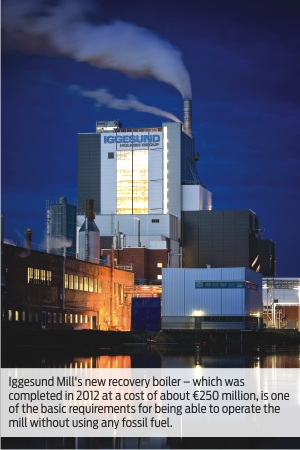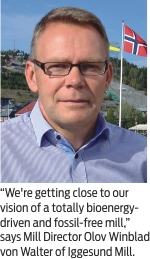“We’re getting close to the vision of a fossil-free mill that we’ve lived with and that has driven our investments for a long time,” says Mill Director Olov Winblad von Walter. “Our new recovery boiler, which came on line in spring 2012, is getting better and better as we fine tune it, and our increasing pulp production is also boosting our energy production.”
For a while in mid-April Iggesund Paperboard’s Swedish paperboard mill, Iggesund Mill, was able to operate solely on bioenergy and also supply almost all its own electricity needs. Another important aspect in the vision for Iggesund Mill is that emissions to air and water should be so low that Iggesund is among the global leaders among comparable manufacturers. Yet another goal is that a minimum of by-products will go to landfill.
Iggesund Mill is one of the world’s integrated paperboard mills with the highest level of investment. When it started up the new recovery boiler was the mill’s biggest investment to date, at a cost of about €250 million. The boiler enabled the mill to gradually increase its annual pulp production from what was then 350,000 tons to 420,000.
“Our sulphate process for pulp production means that we separate out the cellulose fibres that comprise half the mass of a log,” Winblad von Walter continues. “The other half consists of the wood’s binding agent, which is mostly an energy-rich substance called lignin. We burn this in the recovery boiler and it produces enough steam and electricity to cover more than 90 per cent of our energy needs.”
A fossil-free energy supply is not the only benefit from Iggesund’s new recovery boiler. After the boiler had been fine tuned, it turned out that particle emissions from the mill, which were already low, had been halved. Sulphur emissions, which contribute to the acidification of surrounding land, have also fallen by more than 80 per cent from what were already low levels.
Just over a year ago Iggesund’s board mill in Workington, England, radically changed its own energy source. From having run on fossil natural gas, the mill switched to using biomass. Achieving this required the investment of about €122 million in a new biofuel boiler. Today the mill operates solely on biofuel and in addition to covering its own energy needs it also supplies fossil-free electricity to the UK electricity grid.
“One of the goals driving our investments is long-term sustainability, and the investments in both Iggesund and Workington are the result of that approach,” explains Staffan Jonsson, head of Group Technology at the Holmen Group, to which Iggesund belongs.
The Holmen Group is one of the world’s 100 most sustainable companies according to the UN sustainability index, the Global Compact Index.
Iggesund Paperboard is part of the Swedish forest industry group Holmen, one of the world’s 100 most sustainable companies listed on the United Nations Global Compact Index. Iggesund’s turnover is just over €500 million and its flagship product Invercote is sold in more than 100 countries. The company has two brand families, Invercote and Incada, both positioned at the high end of their respective segments. Since 2010 Iggesund has invested more than €380 million to increase its energy efficiency and reduce the fossil emissions from its production.
Iggesund and the Holmen Group report all their fossil carbon emissions to the Carbon Disclosure Project. The environmental data form an integral part of an annual report that complies with the Global Reporting Initiative’s highest level of sustainability reporting. Iggesund was founded as an iron mill in 1685, but has been making paperboard for more than 50 years. The two mills, in northern Sweden and northern England employ 1,500 people.





